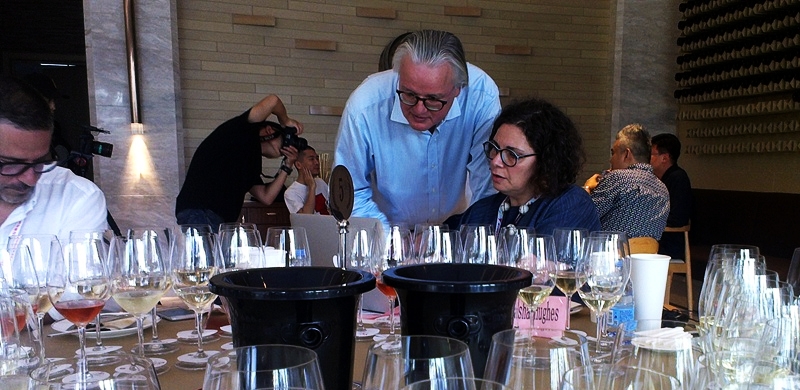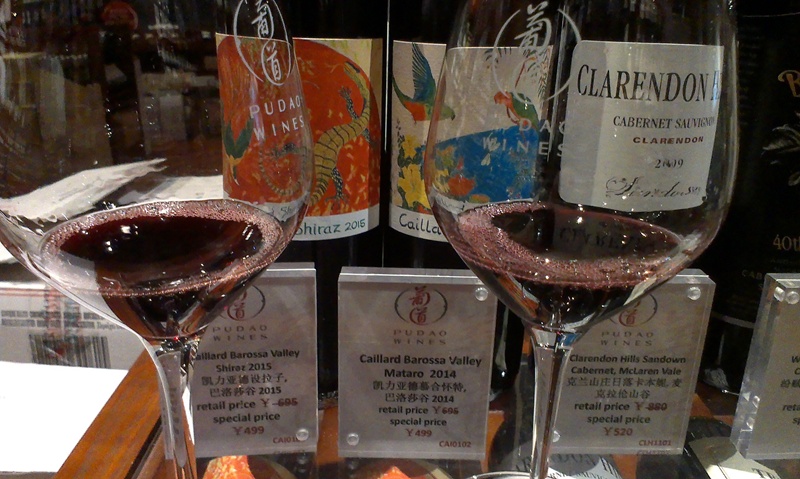
By Jim Boyce |Andrew Caillard has spent tons of time in China, whether to judge in contests like Wine 100, to promote Australian wine in general, his Mataro and Shiraz in particular, or Langton’s classification system, and for projects like the documentary Red Obsession.
I recently talked to Caillard for this Wine Searcher article on Australia’s success in China. Australia tends to use grapes consumers know, offers both “bottled sunshine” newcomers enjoy and nuanced wines for those who like to explore, and has a good reputation for tourism and for food safety. But there are concerns, including a possible dependency on TWE (and Penfolds) as well as the skewing of the numbers by Chinese investing in Australian wine simply for residency reasons. I quoted Caillard in the article and here are more of his thoughts.

On Australia’s appeal:
I think the average Chinese person enjoys Australian wine because it represents an ideal of open spaces, freshness and generosity. Our message is uncomplicated and inclusive with a desire that our wines, at whatever price point, offer value and enjoyment. They are technically well made, varietally defined and often long lasting.
The added bonus of being perceived as being clean, generally incorruptible, and working hard to protect our environment works for us as well. Food safety is a massive issue. The combination of the health advantages of red wine particularly and a national interest in ensuring food safety provides an extra foundation of credibility and trust.
On consumption and transparency:
The way the Chinese consume wine [including heavily through gift giving and private clubs] is different and not always familiar. Chinese retailers seem to offer less of a range but to be highly focused on turnover. Online platforms seem to work better than anywhere else in the world due to the way the Chinese communicate on social media such Wechat. So, although we can’t always see where wine is being distributed or sold, it doesn’t mean that it is a bad thing.
On the trade’s knowledge:
I have been particularly impressed by the incredible thrust of wine knowledge among sommeliers and KOLs [key opinion leaders] over the last ten years and through the prism of Wine100 and other contacts. That thirst for knowledge is incredible and reflected in the number of WSET graduates.
On Chinese investment:
There is an investment in Australian wine that has the potential to undermine our image. The proliferation of cheap brands riding on the success of regions or styles, but essentially bulk wine tailored to suit a very low level market, could erode our standing as the France of the Southern Hemisphere. Even bulk wine masquerading as ultra fine wine is potentially problematic. Although Langton’s Classification has its place here!
There is no question that some of Australia’s export success is related to residency status but this would be generally overstated. Most investors have purchased going concerns and whether good for the image of Australian wine or not, are focused on those businesses for the medium to long term, perhaps betting on the Chinese market continuing to adapt to table wine and so on.
On China-Australia wine links:
China is an important market for Australia and although there are many challenges, including delays at customs and other artificial barriers, I believe that our destinies are linked. Even the local Chinese wine industry is a beneficiary of Australian know how and support. So we need to work hard to understand each other, build trust and enjoy the trade and exchange of wine. It has to be meaningful to be worthwhile.
On the global picture:
The popularity of Australian wine should not be taken for granted. Our success hinges on so many factors, some of which are political and beyond our control. [China’s] current trade war with the U.S. and collateral complications arising out of Australia’s longstanding relationships with traditional alliances, and so on, could lead to a less favourable image of Australia, even though our national character is to be inclusive, generous and engaging.

Sign up for the Grape Wall newsletter here. Follow Grape Wall on LinkedIn, Instagram, Facebook and Twitter. And see my sibling sites World Marselan Day, World Baijiu Day and Beijing Boyce. Grape Wall has no advertisers, so if you find the content useful, please help cover the costs via PayPal, WeChat or Alipay. Contact Grape Wall via grapewallofchina (at) gmail.com.
Leave a Reply
You must be logged in to post a comment.